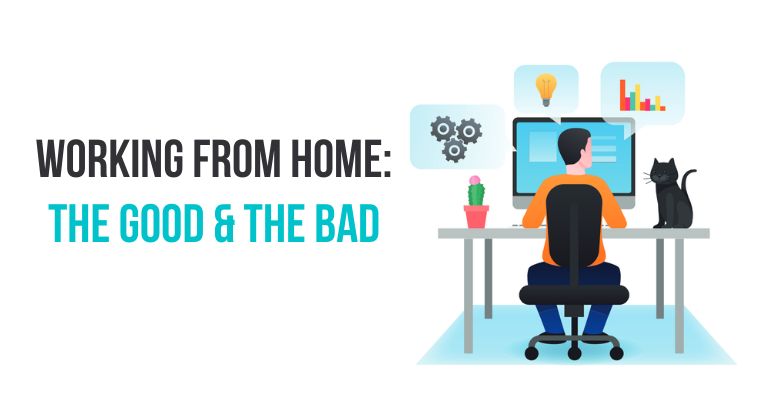
Working From Home: The Good & The Bad
Posted On: April 11, 2020
Work from home is rapidly becoming a desirable benefit that an employer can offer. Especially, keeping in mind the contemporary situation, companies that didn’t have policies in place, are also forced to dive into the idea. But from a larger perspective, the freedom to work in a flexible schedule and location is a great motivation for some who want to do away with the monotony of office life, and even keep working while tending to their families.
A Gartner survey predicts that, By 2030, the demand for remote work will increase by 30% as Generation Z completely enters the workforce.
Working from home helps small businesses to maintain business continuity
In a recent survey, 81% of onsite workers thought that the ability to work remotely would make them happier. Happiness aside, however, small businesses must figure out how to make work from home a reality in COVID 19 crisis. In a severely condensed timeline when the world is under lockdown, the workforce is working from home more than ever before.
The small business needs to keep the virtual doors open and get the productivity out of employees even when the physical doors are closed. Thus maintaining the business, as usual, the little enterprises may be able to save their business and generate revenue. While there’s uncertainty about the lockdown, outsourcing the productivity tools form a more experienced player in risk management will help the business to maximize employee productivity.
Why do employees like working from home?
Stating the obvious – employees enjoy the fact that they can stay at their homes with their families and get work done without the stress of commuting and office spaces. Although some of the employees advocate maintaining a semblance of professionalism by being present at the office, most of them take great delight from the fact that they’re preparing presentations or taking calls while comfortably sitting on their couch or working remotely from wherever they wish.
74% of the employees believe that flexible working has become the “new normal”.
Working from home and having a choice of work environment is now a key factor for many job seekers when evaluating new career opportunities. And of course, working from home can be hugely beneficial, as it is cost-effective. Primarily it will help working parents or those who have another dependent such as an elderly person living with them.
Needless to say, there are pros and cons while working from home. Here we will be exploring those.
The Good:
Most of the organizations have a work from home policy and some are implemented during lockdowns. Here’ are a few reasons why it’s worth considering:
Flexibility = Better employee retention
Better employee retention rate is a byproduct of a flexible working schedule. Childcare is a huge issue for working parents. By allowing them to work from home when needed, such as sick days and during school holidays will definitely win you brownie points over companies that don’t offer work from home. It is also a fact that work from home reduces an employee’s time wasted in commuting and the cost involved therein. More than 26% of the U.S. ‘knowledge workers’ have already quit their jobs to move to companies that allow remote working.
Convenient environment = Improved work-life balance
Employees enjoy more time with family. They do not want to get entangled with office stress. Work from home allows them to work in their choice of environment and people around them. It improves their work-life balance. A person’s stress levels are at their minimum when in a comfortable and familiar environment. Not only does that improve life quality, but it also ensures employee satisfaction.
90% of employees agree to the fact that allowing for more flexible work arrangements and schedules would increase employee morale.
Increased diversity = A wider pool of talent
Companies can also open up to a wider pool of applicants. Maybe the perfect candidate who just happens to be living 150 miles away, can actually be hired via work from home program. Also, this will help disabled or housebound who find it easier to work from home as organizations can open up job vacancies for them.
Happy employees = Better productivity
Productivity is a big concern for any employer. However, depending on the integrity of the employee they are even more productive working from home. While factors like fewer interruptions from their colleagues and their commute being eliminated, they put their focus into work. FlexJobs’ annual survey found that 65% of respondents are more productive in their home office than in a traditional workplace.
The Bad:
As there are good reasons working from home, also some challenges worth considering:
Trust issues
The success of work from home depends heavily on whether you trust employees to do their work even if you can’t see them. Businesses often worry about the lack of visibility into the workflows and routines of their direct reports when they work from home. On the other hand, an employee who works remotely has little contact with what goes on within the office space of their organization. Their level of comfort only decreases with decreasing communication with their peers and leaders, bringing us to the next point.
Poor communication
54% of HR leaders indicated that poor technology and infrastructure is the biggest barrier to effective remote working. While the communication is purely depending upon technology if it ditches both sides can be all over the place.
The lack of communication and bonding between teams and leaders can lead to falling out, decreased employee engagement and even dissatisfaction with work and low morale. Some ways a business can make up for the distance between their employees are online meet-ups, regular conference calls, and even informal catch-up sessions.
Awkward timing
Employees, who are working from home often keep to a more flexible schedule. This is a major bottleneck for organizations when it comes to organizing meetings or conference calls. If something urgent comes up or when you need to speak to someone right there and then, this can be an issue to deal with.
The best way to ensure efficient time management is to allow each employee to figure out the time of day they would want to devote to work completely. A leader could enforce a ‘core time’ wherein all team members must be present to strategize and work at a particular time.
Its harder to switch off
Once the employee leaves the office, it’s easy to declare work over for the day. But when the employees work from home those boundaries can get blurred. From working through breaks and mealtimes to taking calls after office hours; for a remote employee, it becomes tough to differentiate between the time at work and their own downtime.
Fear of isolation and distractions
While working from home it’s easy to be aloof or even become distant from office communication. The isolation begins to set in when an employee loses their touch with the company.
Whether it’s children, pets, or that slightly odd noise of a house bell, it can be a lot easier to take your attention away from your work. To ensure better productivity, one must make sure to devote a dedicated space and time for the working hours in a day, treating it just like an office. With clear guidelines to follow, it becomes easier to stick to a routine to get work done.
Some ways to get through the hurdles
- Have an online meeting platform to keep the employees engaged with the work.
- Use chat platforms to stay in constant touch with the employees. Make sure they are active on it.
- Equip the employees with a knowledge base. Make sure that employees get all the information regarding their business process, and updates about the ongoings within their company.
- Trust your employees but also give them feedback about their work from time to time.
Embrace the good, while overcoming the bad
This sounds a bit oxymoron, but remote work does have some real-time benefits. While the world is under a lockdown period, this might just save your business. In order to maintain business continuity in situations like these, work from home is the solution businesses are adopting. As people are the main asset, allow them to work as per their convenience earns businesses commitment and integrations form employees.
This is where an integrated, smart Work-from-Anywhere solution comes into play. KocharTech is building Leap – a solution that recreates a BPO-like environment in an Internet-enabled space. With complete data safety and security features in place, Leap can expand the capabilities of your business’ remote work model like never before.
To find out more about Leap, reach out to us here.



